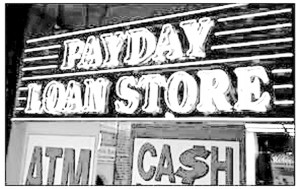Local and national leaders speak out against payday lenders
12th February 2018 · 0 Comments
By Fritz Esker
Contributing Writer
Sen. Jeff Merkley (D-Ore) and the Rev. Willie Gable, Jr. of Progressive Baptist Church in New Orleans believe the Consumer Financial Protection Bureau (CFPB) is being sabotaged by Mick Mulvaney, the acting director of the agency appointed by President Donald Trump.
In a media call last Wednesday (February 7), Sen. Merkley, the Rev. Gable and Yana Miles, senior legislative counsel for the Center for Responsible Lending, spoke at length about numerous problems with Mulvaney’s reign. In under three months on the job, Mulvaney stopped lawsuits against payday lenders and stopped investigating the breach of personal data belonging to 143 million Americans at credit bureau Equifax. He also requested that the CFPB receive no budgetary funding.
The speakers were especially frustrated with Mulvaney’s lax attitude towards payday lenders. When Mulvaney was a Republican Congressman from South Carolina, he received $31,700 in 2015-16 federal campaign cycle contributions from payday lenders. 
In October 2017, before Mulvaney took over at the CFPB, the organization passed the Payday Rule. The rule stated that lenders should look at a person’s ability to repay the loan before lending them money. Lenders were also required to look at the person’s borrowing history and ability to make payments without defaulting on other life expenses. Under Mulvaney’s leadership, the CFPB has announced it is reconsidering the Payday Rule.
Sen. Merkley said payday lenders often charge people exorbitant interest rates that can reach as high as 400-500 percent on short-term loans. If a person cannot quickly repay the loan, they will owe a lot more and may have to take out additional loans to repay the first loan. If a person takes out a $1000 loan but cannot repay it by the end of the year, they can owe $5,000. Sen. Merkley said that this cycle of debt destroys poor, working-class families throughout America.
“Payday lending sweeps individuals into a vortex of debt from which they cannot escape,” Sen. Merkley said.
Sen. Merkley and others are infuriated by Mulvaney’s position and President Trump’s support. Sen. Merkley said the cost that these lenders impose upon working families is antithetical to the values Trump preached during his presidential campaign.
“This is the exact opposite of what Trump promised,” Sen. Merkley said.
The Rev. Gable, the pastor of New Orleans’ Progressive Baptist Church, said that his faith compelled him to speak out on these issues. Religious texts warn against the sin of usury, charging excessive or unfair interest to people. Rev. Gable works with religious organizations like the Faith and Credit Roundtable and Faith for Just Lending on lending issues related to poor communities.
The Rev. Gable echoed Sen. Merkley’s sentiments and said payday loans target the poor and plunge them into a cycle of debt they can never escape. He added that poor people pay more for everything in America (housing, food, etc.) and payday loans are another example. A typical home loan might have a four percent interest rate, but the average payday loan interest rate in New Orleans is a whopping 391 percent.
“People who only need a few hundred dollars quickly find themselves in financial quicksand,” the Rev. Gable said. “It’s time for change and these shackles of debt must be broken.”
The Rev. Gable also emphasized that many of the people targeted by predatory payday lenders have jobs. They may receive some government assistance, but they are the working poor. He said that they are not using payday loans to buy flat-screen TVs; they simply need a little extra money to make ends meet that their jobs do not provide.
The fear among Mulvaney’s critics is that his position will either lead to the elimination of the CFPB or turn it into an organization that supports what it was supposed to fight.
“It’s now an organization that supports predatory practices instead of preventing them,” Sen. Merkley said.
This article originally published in the February 12, 2018 print edition of The Louisiana Weekly newspaper.



